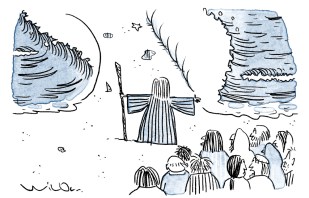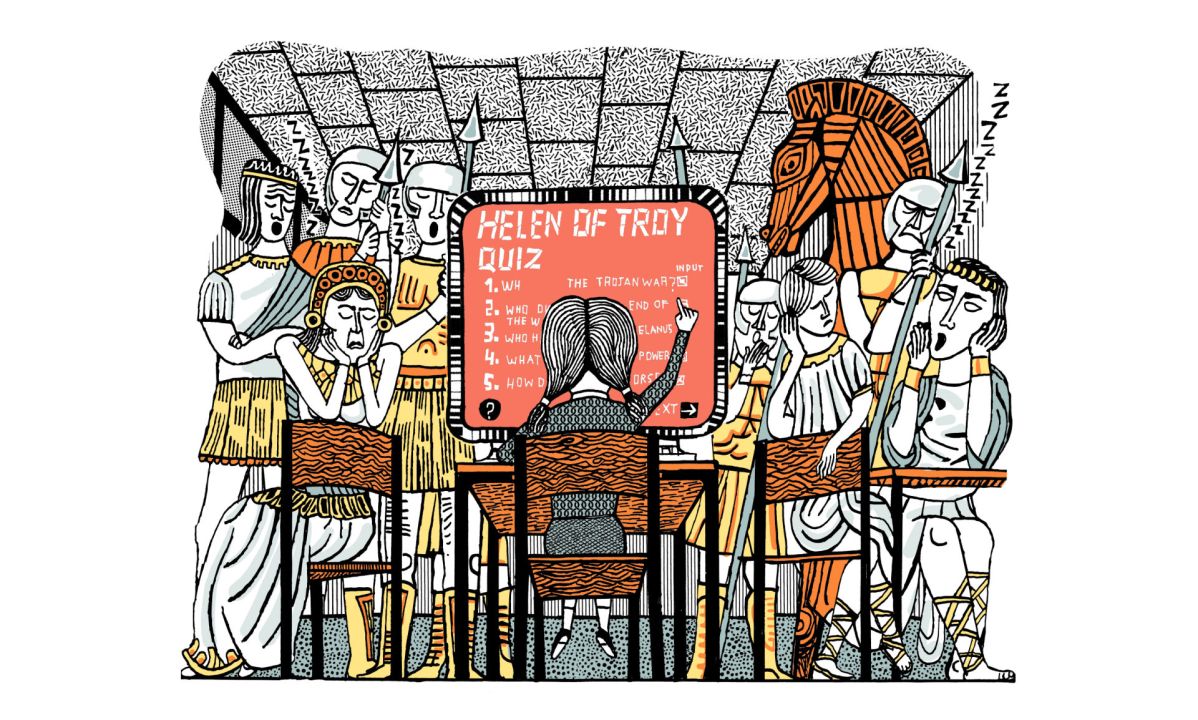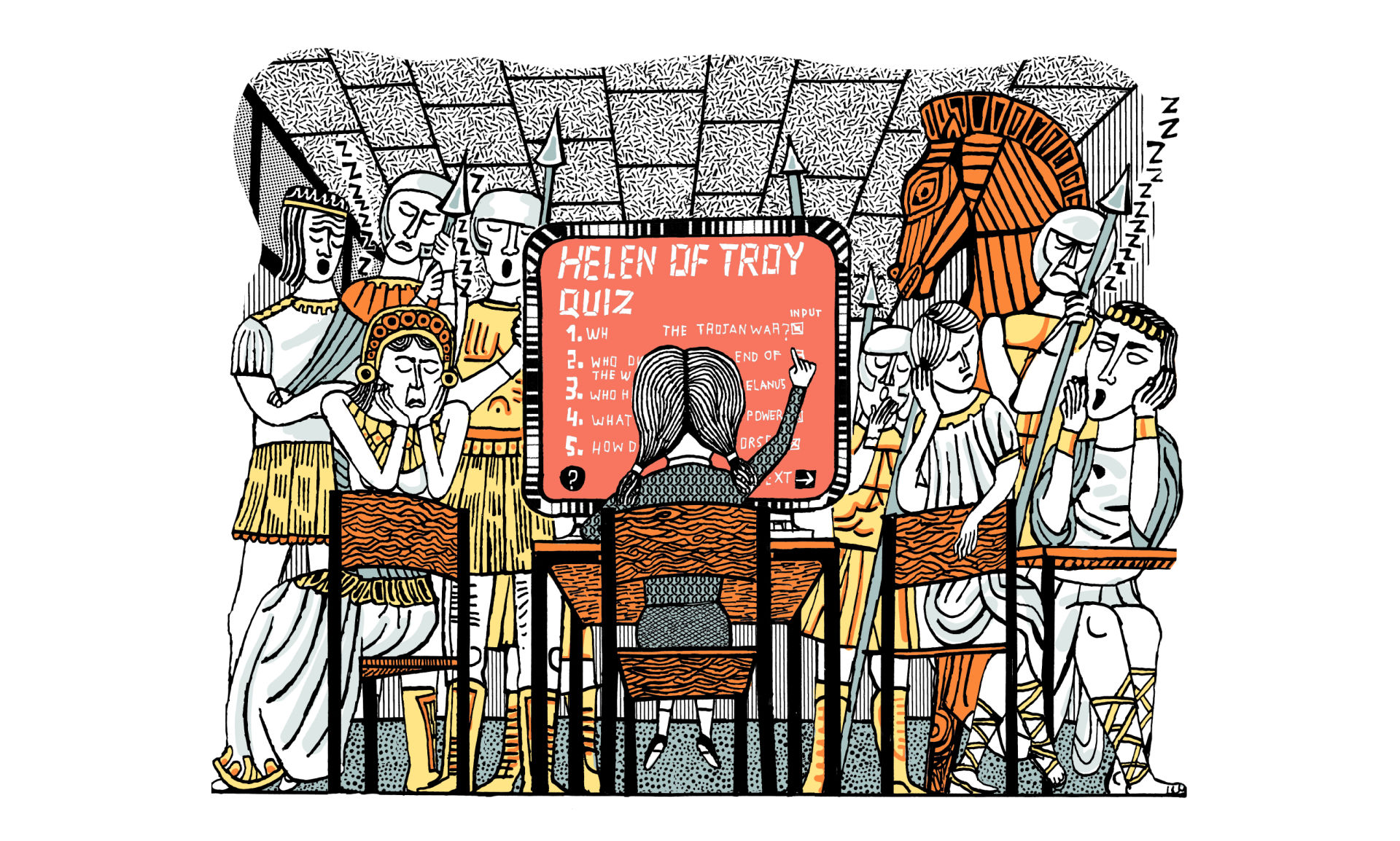To my enormous pride, my six-year-old daughter is an excellent reader. In Reception, she raced through the colour-coded chart of Biff & Chip books with ease and wound up bored. So bored that she took to jumping off trees with increasing exuberance each playtime. She needed to be stretched, the school decided, with only a hint of exasperation.
Stretch her we did. That summer, we read T.S. Eliot’s Old Possum’s Book of Practical Cats aloud, laughing at the names Bombalurina and Macavity. We read Eleanor Farjeon’s Kings and Queens and wondered at how we were all Elizabethans. We read The Diary of Anne Frank and thought about annexes. We read Judith Kerr’s magisterial When Hitler Stole Pink Rabbit and she packed her own evacuee suitcase.
Reading became a chore, each sentence sullenly tripping off my daughter’s tongue before she ran off
Back at school, the books given to her to read were, inevitably, dull. Dull for me to listen to and, it appeared, dull for her to read; Surprise Pancakes for Mum, anyone? Reading became a chore, each sentence sullenly tripping off her tongue before she ran off and I resumed unloading the dishwasher. There’s a reason for this: children need to practise repetitive phonetics and see sentence structure in its infancy to progress.
But still. In the spring term, it was decided that she should become ‘accelerated’, an unusual accolade for a child in Year One. Her delight at this new epithet was beyond measure. ‘I’m accelerating,’ she declared to anyone who would listen. My mother, bemused, wondered if she was taking early driving lessons.
Learner plates aside, Accelerated Reader (AR) is a software programme used by nearly1.2 million children in the UK across primary and secondary schools. Its concept is simple: encourage children to read by letting them choose their own book and then testing them on it via a series of questions given to them to complete on a screen. Rather than simply letting them choose books that then languish unread on their bedroom floors, the quiz holds them accountable to their choice. If you haven’t read the book, you can’t get the star.
For children of an impressionable age, this level of independence is heady, not to say dangerous. To start with, my daughter brought home a series of books on volcanoes, sea animals and climate change. We duly read each, cover to cover, to get top marks in the quiz. When a book on marsupials appeared on the kitchen table, I cracked. ‘Can you please choose a book with a story?’ I asked impatiently. ‘I think you mean fiction,’ she corrected me. So far, so accelerated.
That evening, Helen of Troy by Susan Gates appeared in her book bag. A re-telling of the Trojan war from the perspective of Karis, a serving maid to Helen of Troy, the book encourages children to understand the Trojan war from unbidden perspectives.
As I happened to be reading Pat Barker’s The Women of Troy at the same time, I thought we might compare notes. Not a bit of it. ‘I can’t talk to you about the Troy [sic] because I need to revise for the quiz,’ she said, her brow furrowed. Given that Renaissance Learning, the organisation behind Accelerated Reader, spends a great deal of time in its annual report slicing and dicing statistics on ‘reading enjoyment’ by age, gender and free school meals, it seemed rather sad to me that she felt too stressed to discuss Karis and her view from a fortress in burning Troy. I thought back to our pre-accelerated literary discussions of the summer with sadness.
The quiz, once completed, turned out to be a huge disappointment. Ready to discuss how Helen might have felt and whether she missed Menelaus, she was asked for only the rudimentary details of the story – who kidnapped who etc – and this all on a screen without a teacher or librarian present. ‘I’m still an accelerator though,’ she said, heaving a large tome about elephants into the car.

Ask any teacher about Accelerated Reader and they, too, may start to look like Helen of Troy trapped in a burning fortress against their will. As a programme, it promises to boost ‘engaged reading time’ using the Average Book Difficulty Level (ATOS) to determine the ‘readability’ of a text. By its own admission, Renaissance Learning concedes that ATOS ‘does not analyse content, age appropriateness or literary merit’.
One friend, a teacher in an Oxfordshire prep school, laughed uproariously at the mention of literary merit in relation to AR: ‘The AR bot just directs children to Diary of A Wimpy Kid and Gangsta Granny because it’s notionally in what they term the “zone of proximal development”, and then they wonder why the reading level isn’t high enough.’ Parents, too, have their gripes. One mother, whose son has always been a keen reader, tells how he was ‘aghast to be made to read books he had read three years prior’, which she says led him to ‘lose his love of reading’. ‘I think it helps the teachers more than the kids,’ she concluded with frustration.
Based on data harvested by AR, schools have traded time spent with teachers explaining a text in all its complexity for a blunt algorithm that can’t match the idiosyncrasies of children’s reading choices, the brilliantly crackers reasons why any of us choose to read what we do.
The power of group discussion is also lost. Some of the texts I remember best from my prep-school days – Huckleberry Finn, Animal Farm etc – are the ones we debated in the classroom, each opposing view spurring me to think more critically. Asking children to read a book and then answer questions silently on a screen seems a terrible loss.
So where does this leave my daughter and me this summer? Freed from her data-driven daily reading grind, she has decided to take a dog-eared Ladybird life of Sir Walter Raleigh, found in a charity shop, on holiday with us. We have already spoken about armadas, capes and puddles so big someone must help you over them.
‘Would you read this at school?’ I asked tentatively. ‘No, because those books are far too baby,’ she said with great derision before skipping off to find something that might resemble an Elizabethan ruff. I conclude this: accelerate if you must, but when it comes to the imagination, take your foot off the brake entirely.








Comments